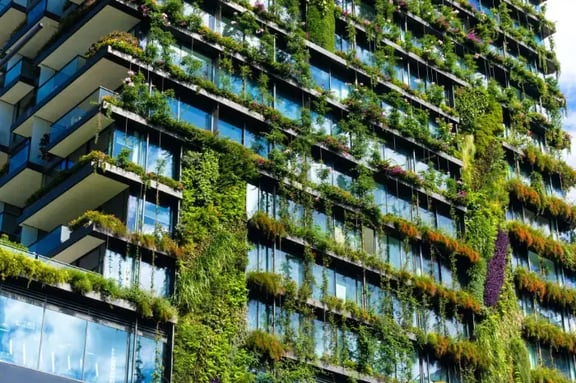Green Buildings: Revolutionizing Commercial Real Estate


As the world becomes increasingly conscious of its impact on the environment, the commercial real estate industry has started to prioritize sustainability. Green buildings, also known as sustainable buildings, are structures designed to reduce energy consumption, minimize waste, and lower greenhouse gas emissions. They offer several benefits to building owners, occupants, and the environment.
In this article, we'll explore the role of green buildings and sustainability in commercial real estate. We'll examine the benefits of investing in sustainable buildings, the technologies and practices involved in creating green buildings, and some frequently asked questions about green buildings.
Green buildings are designed to consume less energy, water, and other resources. This leads to significant cost savings for building owners in the form of reduced utility bills, lower maintenance costs, and increased property values.
Green buildings provide a healthier and more comfortable environment for occupants. They typically have better indoor air quality, temperature regulation, and natural lighting, leading to higher levels of tenant satisfaction and productivity.
Green buildings help to reduce the carbon footprint of commercial real estate by minimizing waste and greenhouse gas emissions. They contribute to a more sustainable and eco-friendly future.
Many governments and municipalities are starting to introduce building codes and regulations that require or incentivize the construction of green buildings. Investing in sustainable buildings can help building owners stay compliant with these regulations.

Green buildings use several technologies and practices to reduce their environmental impact and increase efficiency. Here are some of the most common technologies and practices used in green buildings:
Heating, ventilation, and air conditioning (HVAC) systems are one of the largest energy consumers in commercial buildings. Green buildings use energy-efficient HVAC systems that can reduce energy consumption by up to 40%.
Many green buildings use renewable energy sources such as solar panels, wind turbines, and geothermal systems to power their operations. This reduces the reliance on fossil fuels and minimizes greenhouse gas emissions.
Green buildings use water-efficient fixtures such as low-flow toilets, showerheads, and faucets. They may also incorporate rainwater harvesting systems to reduce water consumption and minimize water waste.
Green buildings use building automation systems to optimize energy use and reduce waste. These systems use sensors and controls to monitor and adjust lighting, temperature, and other building systems based on occupancy and usage patterns.

A green building is a structure that is designed to minimize its impact on the environment by reducing energy consumption, minimizing waste, and lowering greenhouse gas emissions.
The cost of building a green building varies depending on the size, location, and complexity of the project. In general, green buildings may cost more upfront, but the cost savings from reduced utility bills and lower maintenance costs can offset these initial costs.
Green buildings offer several benefits to building owners, occupants, and the environment. They can lead to cost savings, enhanced tenant satisfaction
In conclusion, green buildings and sustainability are becoming increasingly important in the commercial real estate industry. By investing in sustainable buildings, property owners can save costs, improve tenant satisfaction, and reduce their environmental impact. Technologies and practices like energy-efficient HVAC systems, renewable energy sources, water conservation, and building automation systems are key to achieving these goals. As the demand for sustainable buildings continues to grow, it's important for commercial real estate advisors to stay up-to-date on the latest trends and best practices in this field.
At North Star Commercial Real Estate Advisors, we're committed to helping our clients achieve their sustainability goals. Our team of experts can provide guidance on green building certifications, energy audits, and sustainability strategies that can help you save costs and improve tenant satisfaction. Contact us today to learn more about our services and how we can help you navigate the evolving landscape of sustainable commercial real estate.
By Scott Naasz
Founder and President Broker
North Star Commercial Real Estate Advisors
Keller Williams Preferred Realty

Investing in real estate is a proven avenue for building wealth and achieving financial security. While residential real estate often takes the...
Read more »
Investing in commercial real estate can be a lucrative and rewarding financial move, but it is also fraught with risks and challenges that require...
Read more ».webp?width=352&name=Thumbnails-1%20(1).webp)
In the rapidly evolving landscape of commercial real estate, blockchain technology emerges as a transformative force, promising heightened...
Read more »